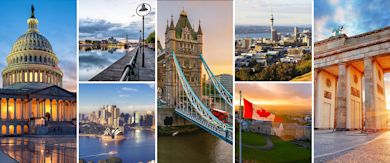- Duyurular ve Makaleler
- Etkinlikler
- Bize ulaşınIDP AustraliaIDP BahrainIDP BangladeshIDP CambodiaIDP CanadaIDP ChinaIDP EgyptIDP GhanaIDP Hong KongIDP IndiaIDP IndonesiaIDP IranIDP JordanIDP KenyaIDP KoreaIDP KuwaitIDP LebanonIDP MalaysiaIDP MauritiusIDP Middle EastIDP NepalIDP New ZealandIDP NigeriaIDP OmanIDP PakistanIDP PhilippinesIDP Saudi ArabiaIDP SingaporeIDP Sri LankaIDP Taiwan, ChinaIDP ThailandIDP UAEIDP VietnamIDP Corporate
- Sosyal Medya
- Türkçe
Ele Alınan Konular
- Published: 22 May 2022
Canada is famous for its pristine landscape (especially its vast mountain ranges), rich history and diverse blend of people and cultures.
It's the second largest country in the world and extends from the US in the south all the way to the Arctic Circle in the north.
Canada is made up of ten provinces and three territories. The capital city is Ottawa but you might also be familiar with other major cities like Vancouver, Toronto and the French-speaking Québec and Montréal.
Canada is bilingual, with English and French being the two official languages, but most people speak English at home.
You might hear some common Canadian slang such as loonie (a dollar coin), chinook (a warm wind that comes over the mountain in mid-winter) and Hog Town (nickname for Toronto).
Indigenous culture
There are three different groups of Indigenous people in Canada: First Nations, Inuit and Métis.
The First Nations people settled in Canada over 15,000 years ago and developed many different communities, each with their own customs, culture and character.
Today there are 634 recognised First Nations governments or groups across Canada, mostly in the provinces of British Columbia and Ontario.
The Métis are descendants of unions between First Nations peoples and Europeans, mainly French traders. While the Métis mainly speak English today, you may hear some Michif, or Métis French as people increasingly take more interest in traditional languages and culture.
The Inuit are the descendants of Thule culture and live in the Arctic regions of Greenland, Canada and Alaska.
Weather
When you think of the weather in Canada, you might think of extreme cold and snow, but this isn't always the case. The weather in Canada is as varied as its landscape.
Generally, you will experience the following weather conditions in each season:
- Summer (June to August): the weather is usually warm to hot, with daytime temperatures between 20°C and 30°C or higher.
- Autumn (September to November): the weather starts to get colder and there is often a lot of rain.
- Winter (December to February): winters are very cold, with temperatures often staying below freezing all day long.
- Spring (March to May): the weather starts to get warmer and days are typically very pleasant.
You will need to remember to wind your clock forward by one hour on the second Sunday in March, as that is the start of Daylight Saving Time in most parts of Canada.
Daylight Savings lets you make the most of the warmer weather in spring, summer and autumn, as you get more daylight in the evening.
Politics and government
Canada is a constitutional monarchy, which means all decisions are made by the government and a democratically elected Prime Minister.
Canada's head of state is the Queen of the British royal family, who is represented by the Governor-General.
There are three levels of government in Canada:
- Federal: headed by the Prime Minister, the federal government deals with national and international matters like national defence and foreign affairs.
- Provincial or territorial: this level of government has the power to change laws and manage their own public lands.
- Municipal (local): this level governs individual cities, towns or districts and is normally responsible for things like roads, emergency services, public transportation and some local health and social services.
One account for all your study abroad needs
Create your profile and unlock a wide array of features including personalised recommendations, fast-tracked applications and much more.
Search for articles
Dive into our extensive collection of articles by using our comprehensive topic search tool.













